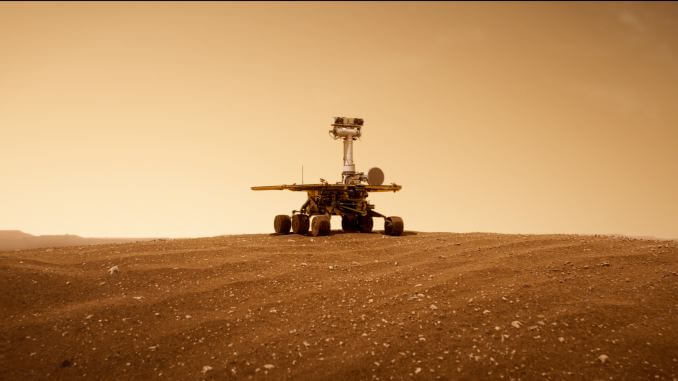Good Night Oppy Finds a Heartfelt Ode to Human Connection in a Mars Rover

What if I told you that one of the most absorbing protagonists of the year is a motorized vehicle? 2022 has been an exceptional year for the complex and captivating film protagonist: We got to revisit Tom Cruise’s beloved Navy aviator; Michelle Yeoh stole our hearts as an ass-kicking laundromat owner; anyone who claims that Marcel the Shell with Shoes On didn’t make them cry is clearly lying. But I’m not talking about them. I’m talking, of course, about Opportunity, or “Oppy,” the rover that NASA shot to Mars in July of 2003 to search for proof that the planet once retained water and, perhaps, hosted life.
Directed by Ryan White, Good Night Oppy follows Oppy and her twin sister Spirit, the machines that became beloved public spectacles when they exceeded their projected expiration dates by years. Good Night Oppy tells their stories in a neat blend of archival footage of rocket launches and NASA situation rooms, interviews with the masterminds behind the dynamic duo, and sublime CGI reimaginings of the rovers’ adventures on Mars, courtesy of the VFX magicians at Industrial Light & Magic.
Seamlessly edited together by Rejh Cabrera and Helen Kearns, the assortment of footage weaves an engrossing story. Even if one were to remove the artistry and emotional resonance from Good Night Oppy, Oppy’s story is more than enough to keep our eyes glued to the screen. The billion-dollar little-robot-that-could was in the works for decades, and after surviving being launched millions of miles into space within an air-tight window of time, she managed to weather the angry conditions of the big red planet for a staggering 15 years. Not only was this a once-in-a-lifetime scientific feat, but one that also helped us obtain near-proof of life on Mars.
But Good Night Oppy doesn’t just force us to rely on the undeniable allure of the story at hand. White takes care to illustrate that this isn’t just a riveting mission, emphasizing that—cushioned between spellbinding footage of a rocket piercing the atmosphere—real, emotional stories effectively double the film’s stakes by turning a story filled with science and space into something distinctly human and relatable.
One of the emotional centerpieces of Good Night Oppy is planetary scientist Steve Squyres, the mastermind behind Oppy and Spirit. But it isn’t necessarily his explaining the nitty-gritty of building intelligent rovers that makes his story so compelling, nor is it the cunning way that he convinced NASA to give him ten figures to assemble them. No, what makes Steve such an irresistible element of Good Night Oppy is his attitude toward Oppy and Spirit—the way that he challenges the boundaries of human and robot by thinking of them as his own children.
-

-

-

-

- Curated Home Page Articles By Test Admin October 21, 2025 | 3:10pm
-

- Curated Home Page Articles By Test Admin October 21, 2025 | 2:57pm
- Urls By Test Admin October 21, 2025 | 2:57pm
- Curated Home Page Articles By Test Admin October 21, 2025 | 2:55pm
-

-

-

-

-

-

-

-

-

-

-

-

-

-

-

-

-

-

-

-

-

-

-

-

-

-

-

-

-

-

-




































